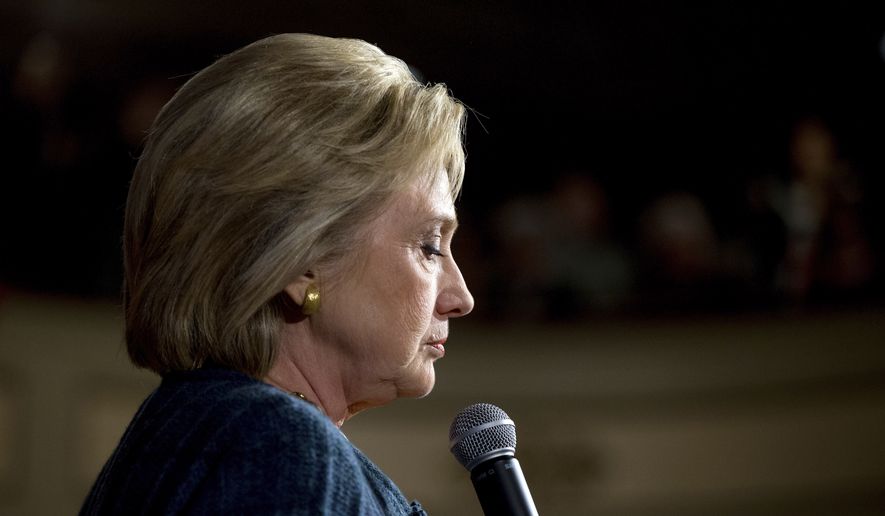More than one in four of the emails the State Department released late Friday from former Secretary Hillary Clinton’s cache of messages were deemed classified or secret, marking a massive hike in the scope of potential wrongdoing the Democratic presidential frontrunner engaged in during her time in office.
The department released more than 900 pages — just a small fraction of the total it was supposed to produce under a court order — and of those, 229 were deemed to have information needed to be redacted because it was rated classified, and another 11 were rated “secret.”
Those are in addition to the 22 messages the department acknowledged earlier in the day contain “top secret” information and cannot be released at all because they are so sensitive.
Among the new secret messages are an exchange on Aug. 24, 2011 between Mrs. Clinton and top aide Jacob Sullivan, with the subject line “Rasmussen call.” The entire content of the message is redacted, with the label saying it was withheld under the National Security Act of 1947.
Also labeled secret were emails that appeared to give inside details of assassination attempts on on U.S. troops in Afghanistan.
The new messages released Friday add to the thousands released over the last six months in response to a judge’s order. As ofFriday evening, the State Department had released 26,610 messages, had deemed 1,550 of them classified and another 19 secret.
SEE ALSO: State Department declares 22 Hillary Clinton emails ‘top secret’
Some 5,000 or so messages are still to come, and are now overdue, according to the schedule federal Judge Rudolph Contreras laid out last year, which called for all of the messages to be produced by Jan. 29.
If the rate of classification in Friday’s release — 26 percent — holds true for the rest of the emails, it could mean some 1,250 more classified messages in the final 5,000 emails still to be released.
After the State Department earlier in the day announced it had deemed some 22 messages “top secret” and wouldn’t release them at all, the Clinton campaign complained, saying it didn’t believe the messages should have been deemed classified and complaining that the Obama administration was being too strict with security.
“This appears to be over-classification run amok,” said spokesman Brian Fallon. “We will pursue all appropriate avenues to see that her emails are released in a manner consistent with her call last year.”
The State Department, which Mrs. Clinton used to head, said it made the decision to dub the messages top secret, though it had input from the intelligence community.
The emails have been a problem for Mrs. Clinton for months, but they have turned into a fiasco in the last couple of weeks.
State Department officials, blaming last week’s snowstorm and an “oversight” on their own part, had to tell Judge Contreras they weren’t going to meet his Jan. 29 deadline — set more than six months ago — for releasing all of the messages.
They said they forgot to send many of the messages out to other agencies who need to review them for redactions before they can be released. That likely explains why these messages have the highest classification rate.
Meanwhile, speculation that Mrs. Clinton’s behavior may have crossed the lines into criminal conduct has spiked on the campaign trail, where she is fending off questions about her email practices, and Republicans are predicting she may be indicted before the election.
The White House said Friday that Mrs. Clinton is not in legal jeopardy, given what officials there have seen of the case.
“Based on what we know from the Department of Justice, it does not seem to be headed in that direction,” press secretary Josh Earnest said.
Mrs. Clinton declined to use the State Department’s main email system during her four years in office, instead keeping her emails on a server she maintained at her home in New York.
In addition to cybersecurity questions about the arrangement, by keeping the messages herself she also kept them from public view, foiling open-records requests and demands for information from Congress.
Two years after she left office, and at the prodding of the congressional committee looking into the 2012 Benghazi terrorist attack, she returned some 32,000 messages she said were work-related, and declined to turn over about 30,000 messages from her server from that time period that she said were personal.
It is those work-related messages that are now being released to the public, just as Mrs. Clinton prepares to face voters. The first nominating contest is Monday in Iowa, where she is locked in a tight battle with Sen. Bernard Sanders for the Democratic nomination.
• Stephen Dinan can be reached at sdinan@washingtontimes.com.




Please read our comment policy before commenting.